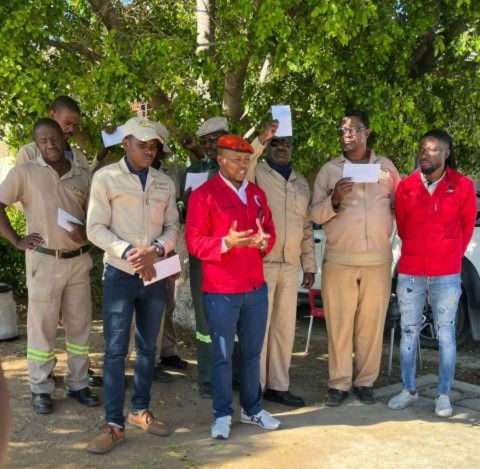A SMALL Namibian winery located in arid southern Namibia is taking the world of grapes and tannins by storm. The Neuras Winery near Maltahöhe has already attracted the attention of international wine makers, connoisseurs and not least the media.
The British BBC and Daily Telegraph, French Television and numerous German newspapers have reported on the extraordinary little farm that produces a water-intensive product in an area with an annual rainfall of less than 100 mm, prompting the Telegraph to call it the ‘world’s driest vineyard’.After buying Neuras in 1996, former Shell Namibia Managing Director Allan Walkden-Davis and his wife Sylvia were coaxed into planting a few Shiraz and Merlot vines by their friend Jaco van der Merwe, director of Riebeek Cellars in South Africa at the time.After Van der Merwe took the soil and water for testing in South Africa, it was discovered that both compared well with Stellenbosch’s finest wine-growing areas. The solution of the water problem in Neuras lies in the name, meaning ‘abandoned water’ in the local Koikoi language, as Neuras has a number of springs that are used to irrigate the vines.Back in the day of the Schutztruppe, the farm was used to grow cereals and vegetables for German troops. Wine needs a very specific climate to thrive, and most winemakers in the world would predict that the dry desert heat of the Namib would make grapes ripen far too quickly for any complex flavours to develop.But Walkden-Davis says a local weather phenomenon solved this problem for them naturally. A cool westerly wind coming off the coast in the evening ensures a drop in temperature that allows the grapes to ripen more slowly. This leads to Neuras harvesting its grapes in February, a full three months later than the surrounding table grape producers. The vineyard will harvest just under four tonnes this year, which will make about 2 400 bottles of the Neuras ‘Edge of the Namib’ Shiraz. In its most productive year, the winery produced about 3 000 bottles, a very small number in commercial terms, making it highly sought after. The vineyard also makes a blend of Shiraz and Merlot called the Namib Red, but due to low harvests of Merlot they have not been able to produce the blend for the last few years. Walkden-Davis says the winery was initially going to be only ‘a hobby type of thing’ but that it currently takes up most of his time. To this end, Walkden-Davis has gone on numerous training courses in South Africa and is currently under the guidance of Abrie Brouwer, consultant for the well-known Springfield Estate at Robertson. He also says he received a lot of useful tips from winemakers from as far away as Romania, Brazil and New Zealand. Neuras Wines are produced to the South African standard, one of the most stringent in the world, and samples are regularly sent for testing there. The wine is matured in French oak barrels, is handmade and organically grown, emphasising the ‘quality, not quantity’ philosophy of the vineyard. It is only sold at the estate itself, as Walkden-Davis says they simply do not have the numbers to distribute.Gathemann’s Restaurant in Windhoek is currently the only establishment in the world to stock Neuras wine. International wine celebrity Oz Clark, who went on an incognito taste test at the farm, heralded the 2005 Shiraz for its ‘wonderful chocolaty-blackberry flavours’. The Shiraz currently sells for R235 and the Namib Red for R160.The Telegraph also reports that Walkden-Davis plans to spend a further N$4,5 million in planting 6 000 more vines in the near future to expand production.
Stay informed with The Namibian – your source for credible journalism. Get in-depth reporting and opinions for
only N$85 a month. Invest in journalism, invest in democracy –
Subscribe Now!










